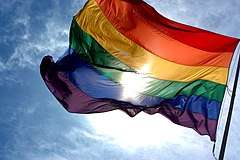Homonationalism
Homonationalism is the favorable association between a nationalist ideology and LGBT people or their rights.[1][2][3]
The term was originally proposed by the researcher in gender studies Jasbir K. Puar in 2007 to refer to the processes by which some powers line up with the claims of the LGBTI community in order to justify heterophobia, racist and xenophobic positions, especially against Islam, basing them on prejudices that migrant people are supposedly homophobic and that western society is entirely egalitarian.[1][2][4][5][6][7][8][9] Thus, sexual diversity and LGBT rights are used to sustain political stances against immigration, being increasingly common among far-right parties.[10][11][12]
The main critiques of this phenomenon focus on the partial and sectarian use of the LGBT movement to further ends based in intolerance, ignoring the homophobia and lack of real equality in Western society as a whole.[13][14] This idea of equality is usually symbolically represented by the access to equal marriage, heteronormalizing the relations between the people of the LGBTI community and favouring chauvinistic positions towards the Western country and suspicions towards people coming from those countries that have not legalized any kind of recognition of same-gender couples or that still criminalize homosexuality, often associating those stances with Muslims.[2][15][16][17][18][19] Since developing the concept, Puar has more recently argued that the concept should not be used as an accusation or an identity, but is instead a transnational process that represents a historical shift.[20]
Bruno Perreau has criticized the premises of Puar's argument. While agreeing with her critique of nationalist claims among some LGBT groups, he shows that Puar idealizes those she calls the "sexually nonnormative racialized subject."[1] Perreau explains that "deconstruction of norms cannot be dissociated from their reproduction."[21] Jason Ritchie has also critiqued some of the ways homonationalism has been used, especially as a totalizing theory.[22]
List of Homonationalists/ LGBT Nationalists
- Ernst Röhm - German military officer and an early member of the Nazi Party. As one of the members of its predecessor, the German Workers' Party, he was a close friend and early ally of Adolf Hitler.
- Edmund Heines - Nazi Party leader and Ernst Röhm's deputy in the Sturmabteilung or SA. He was eventually executed in the purge that would come to be known as the Night of the Long Knives.
- Otto Rahn - German writer, medievalist, Ariosophist, and an officer of the SS, who researched Grail mythos. He was born in Michelstadt, Germany, and died in Söll (Kufstein, Tyrol) in Austria. Speculation still surrounds Otto Rahn and his research.
- Philipp, Landgrave of Hesse - He joined the Nazi Party in 1930, and, when they gained power with the appointment of Adolf Hitler as Chancellor in 1933, he became Governor of Hesse-Nassau.
- Karl-Günther Heimsoth - German physician, polygraph, and politician. Heimsoth was a member of the Nazi Party.
- Gerhard Roßbach - German Freikorps leader and organizer of nationalist groups after World War I. He is generally credited with inventing the brown uniforms of the Nazi Party after supplying surplus tropical khaki shirts to early troops of the Sturmabteilung (SA).
See also
Further reading
- Mikdashi, Maya (December 16, 2011). "Gay rights as human rights: pinkwashing homonationalism". Jadaliyya. Arab Studies Institute (ASI).
- Mikdashi, Maya; Puar, Jasbir (August 9, 2009). "Pinkwatching and pinkwashing: interpenetration and its discontents". Jadaliyya. Arab Studies Institute (ASI).
- Puar, Jasbir (May 2013). "Rethinking homonationalism". International Journal of Middle East Studies, special issue: Queer Affects. Cambridge Journals. 45 (2): 336&ndash, 339. doi:10.1017/S002074381300007X.
- Schotten, C. Heike (2016). "Homonationalism: from critique to diagnosis, or, we are all homonational now". International Feminist Journal of Politics. Taylor and Francis. 18 (3): 351&ndash, 270. doi:10.1080/14616742.2015.1103061.
References
- 1 2 3 Puar, Jasbir K. (2007). Terrorist Assemblages: Homonationalism in Queer Times. Duke University Press. p. 83. ISBN 978-0-8223-4094-2.
- 1 2 3 Homonationalism, Heteronationalism and LGBTI Rights in the EU. Public Seminar. 31 August 2016.
- ↑ Homonationalism and Pinkwashing. CLAGS. Center for LGBTQ Studies. 2013.
- ↑ Homonationalism and the Death of the Radical Queer. Inquiries Journal. 2015.
- ↑ (in Spanish) Conchita Wurst y los peligros del homonacionalismo. Periódico Diagonal. 21 May 2014.
- ↑ (in Spanish) Nuevo nacionalismo y movimiento gay. Viento Sur. 15 July 2012.
- ↑ In America, Muslims Are More Likely to Support Gay Marriage Than Evangelical Christians. Reason. 13 June 2016
- ↑ (in Catalan) La regidora musulmana de Badalona casa una parella gai. Directe!cat. 11 January 2016.
- ↑ (in Portuguese) Homonacionalismo e cidadania LGBT em tempos de neoliberalismo: dilemas e impasses às lutas por direitos sexuais no Brasil. Revista Em Pauta. 2014.
- ↑ The Men Who Would Be Queen: France, Le Pen & The LGBT Vote. Pride Life. 7 June 2016.
- ↑ (in Spanish) El ascenso de la extrema derecha en Europa, en clave LGTB. Dos manzanas. 2 June 2014.
- ↑ (in French) Homo et d'extrême droite: qu'est-ce que «l'homonationalisme»? Le Monde. 22 December 2014.
- ↑ Why Pinkwashing Insults Gays and Hurts Palestinians. Slate Magazine. 17 June 2014.
- ↑ Sporting Homonationalism: Russian Homophobia, Imaginative Geographies & the 2014 Sochi Olympic Games. Sociology Association of Aotearoa New Zealand Annual Conference 2013.
- ↑ Homonormativity, Homonationalism and the Other 'Other'. Huffington Post. 19 March 2015.
- ↑ (in Spanish) Muy español y muy gay: ‘homonacionalismo’ vs. radicales religiosos. El Confidencial. 18 July 2011.
- ↑ (in French) Vers un nouvel homonationalisme? Mediapart. 5 December 2012.
- ↑ From Orientalism to Homonationalism: Queer Politics, Islamophobia and Europeanization in Kosovo. Southeastern Europe. 2016.
- ↑ Israel and ‘Pinkwashing’. The New York Times. 22 November 2011.
- ↑ Puar, Jasbir. "Rethinking Homonationalism". International Journal of Middle East Studies.
- ↑ Bruno Perreau, Queer Theory: The French Response, Stanford University Press, 2016, 124.
- ↑ Ritchie, Jason (2014). "Pinkwashing, Homonationalism, and Israel–Palestine: The Conceits of Queer Theory and the Politics of the Ordinary". Antipode. 47: 616–634. doi:10.1111/anti.12100.
